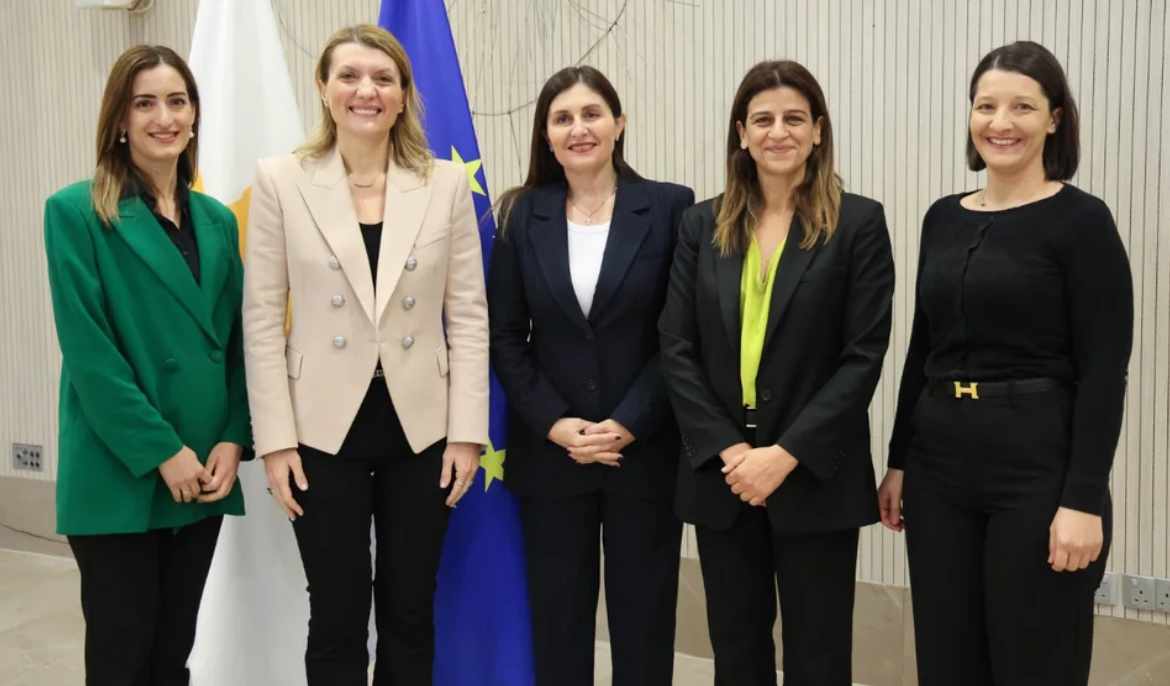Shipping Deputy Minister Marina Hadjimanolis, and Gender Equality Commissioner Josie Christodoulou hosted a press conference on Wednesday at the Presidential Palace to launch the ‘Women in Shipping’ campaign.
This initiative, a collaboration between the commissioner and the Deputy Shipping Ministry, seeks to raise awareness and highlight the growing role of women in the maritime sector.
Hadjimanolis began by offering her warm congratulations to the commissioner and her team for their innovative work, which she noted is “perfectly aligned with the priorities of President Nikos Christodoulides.”
“I would like to express my deepest gratitude to Despina Theodosiou Panayiotou, Elpi Petraki, Natalia Bury Loyal, Pavlina Panayiotou, and Veronica Agatha Pupou for their participation in the video,” she said, commending them as inspirational role models.
The campaign featured five prominent women from the maritime industry, each sharing their personal experiences and challenges, along with offering inspiring messages for young women contemplating a career in this field.
Despina Panayiotou Theodosiou, co-owner of Tototheo Global and immediate past president of WISTA International, discussed the social prejudices women face when entering maritime professions.
She explained that the most important barrier is the belief that maritime careers are not suited for women, particularly those working aboard ships. This perception continues to limit opportunities for women in the sector.
Meanwhile, Natalia Bury Loyal, president of WISTA Cyprus and Chief Operations Officer at Tototheo Global, noted that while women’s participation in land-based professions has risen, more work is needed to encourage women into managerial roles within the industry.
She stressed that “as a seafarer, there is still minimal female representation, but this can change if equal opportunities continue to be advocated for.”
Veronica Agatha Poupou, a student at the Maritime Academy, spoke positively about the increasing number of women in roles such as captains and officers.
She expressed her hope that this progress will inspire more young women to enter the industry.
This sentiment was echoed by Elpi Petraki, president of WISTA International, who emphasised the importance of ensuring equal opportunities for all professionals.
Petraki encouraged young women to “pursue their ambitions, saying that anything is possible with hard work, education, and finding the right mentors and role models.”
Pavlina Panayiotou, a student of Nautical Science and Chief Officer, shared her personal perspective, encouraging women to believe in their abilities.
She acknowledged that “the profession can be difficult but assured them that the challenges can be overcome, noting that while sacrifices may be made, the rewards are worth it.”
Hadjimanolis described the women as “our fellow travellers in this vital effort to promote female employment and empowerment within our sector,” emphasising the historical underrepresentation of women in what has traditionally been seen as a ‘male-dominated’ industry.
She pointed out that this perception is entrenched in both the nature of the work and societal norms.
“The removal of this prejudice and the further integration of women into shipping positions remains one of our top priorities,” she explained.
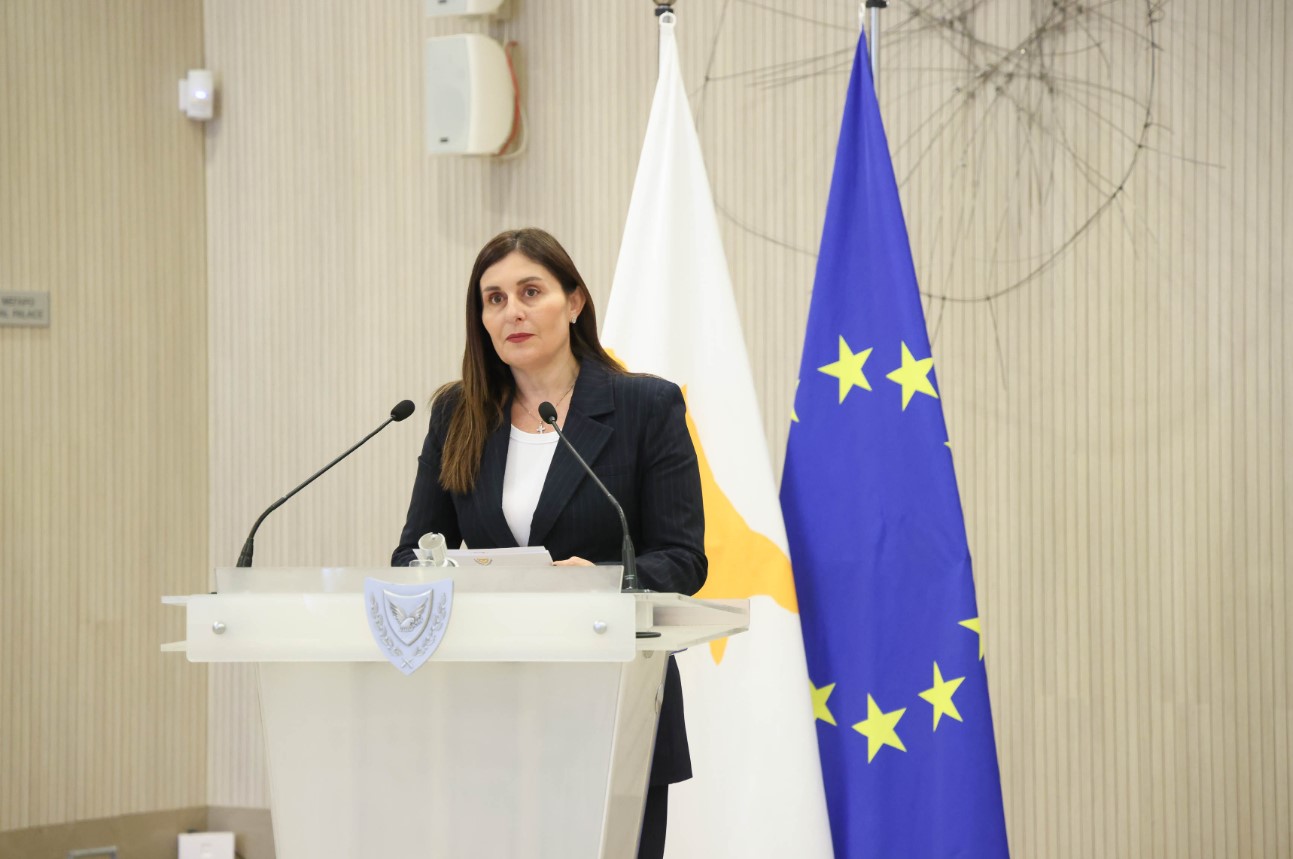
The central aim of the campaign, according to Hadjimanolis, is to inspire younger generations, particularly young women, to develop a passion for the sea, to engage with the shipping industry, and to consider it as a viable career choice.
“Through this, we hope to strengthen the global maritime industry with a wealth of highly qualified and educated women,” she remarked.
She also emphasised the need for parents to be properly informed about the vast opportunities available within the sector.
“In Cyprus, our insular identity is one of the cornerstones of our culture,” she continued, saying that “It is our responsibility to create the best possible conditions to encourage more women to join the shipping industry.”
She went on to point out that Cyprus has become a fully developed maritime centre, with a Shipping Register of the highest international standards. This has contributed significantly to the country’s prominent position on the global maritime map and its vital role in international maritime events.
According to Hadjimanolis, the shipping sector offers a broad range of career opportunities for women, whether as seafarers, officers, or captains aboard ships, or in roles ashore such as in cruise lines, ship management companies, insurance firms, and IT services.
“Shipping contributes 7 per cent to our nation’s Gross National Product (GDP), and its impact is felt not only in economic terms but also culturally, in employment, and in the social fabric of our island,” she said.
She went on to highlight the ongoing efforts of the Deputy Shipping Ministry, which has incorporated several key initiatives within the framework of the Cypriot Government’s commitment to gender equality, as outlined in the National Strategy for Gender Equality 2024-2026.
“Among these initiatives is the establishment of the ‘Gender Equality Award in Cyprus Shipping,’ which is presented annually as part of the International Day for Women in Shipping celebrations,” Hadjimanolis explained.
Additionally, the ministry has introduced two scholarships for Cypriot women to study Shipping at postgraduate level at prestigious institutions abroad, such as the World Maritime University in Sweden and the International Maritime Law Institute in Malta.
These scholarships, worth €20,000 each, are aimed at fostering greater female representation in maritime leadership roles.
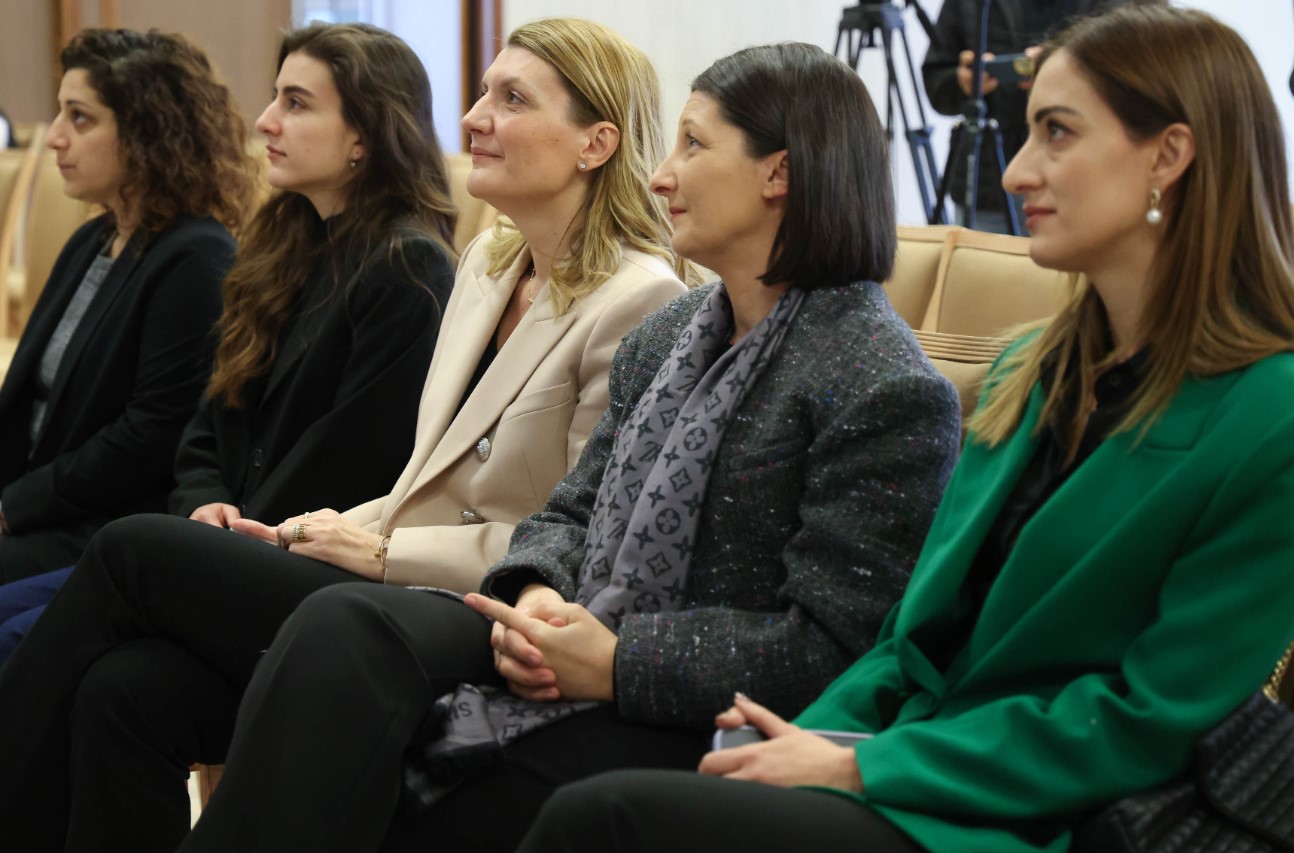
“As part of our efforts to strengthen Cyprus’ position in global maritime forums,” she continued, “Cypriot candidate Despina Theodosiou was honoured with the first-ever Gender Equality Award by the International Maritime Organisation in London last May.”
Further initiatives include promoting maritime education in schools and organising workshops and presentations for students, in collaboration with the Ministry of Education and other relevant bodies.
“We are optimistic that, together, we can do more to address inequalities and dismantle the stereotypes that continue to exclude women from this sector,” Hadjimanolis said.
She completed her speech with a call to action for young women to pursue their dreams, take advantage of the opportunities available, and envision themselves in leadership roles in the future.
“I am confident that some of these young women will one day be the ones in the positions we occupy today,” she concluded, with a hopeful look toward a more inclusive future for women in shipping.
Christodoulou continued at the conference by emphasising the launch of the second edition of the ‘Women’s Stories’ campaign, builing on the success of the inaugural edition, which centred on STEAM professions.
“Women make up 50 per cent of our population, and yet, in many cases, they are neither treated nor represented equally,” Christodoulou remarked, offering insight into the campaign’s purpose and the rationale behind its title.
The goal of these campaigns, Christodoulou explained, is to increase women’s participation across all fields.
By sharing the stories of successful women, the initiative aims to inspire girls and young women to pursue their dreams, irrespective of societal expectations.
“The main aim of these campaigns is to increase the participation of women in all areas of activity,” she stated, underlining the importance of providing role models for younger generations. She referred to a variety of events, such as ‘women and mathematics’ or ‘women in diplomacy,’ all of which share a common theme: women require both space and a voice to tell their own stories.
The campaign also addresses long-standing gender stereotypes, which have often classified certain professions as ‘male-dominated’ or ‘female-dominated’.
Christodoulou noted, “Male-dominated occupations are more economically valued than female-dominated ones,” emphasising the persistent gender pay gap.
She further stressed the necessity for societal change, drawing attention to recent findings from the Eurobarometer survey. “54 per cent of men and 52 per cent of women agreed with the view that the most important role of men is to earn money,” she pointed out, acknowledging that these outdated perceptions still exist but are being increasingly challenged.
Despite these deeply ingrained beliefs, the Eurobarometer survey also revealed that both men and women recognise the benefits of gender equality.
“When asked whether men would also benefit from gender equality, men agreed with 76 per cent and women with 88 per cent,” Christodoulou revealed.
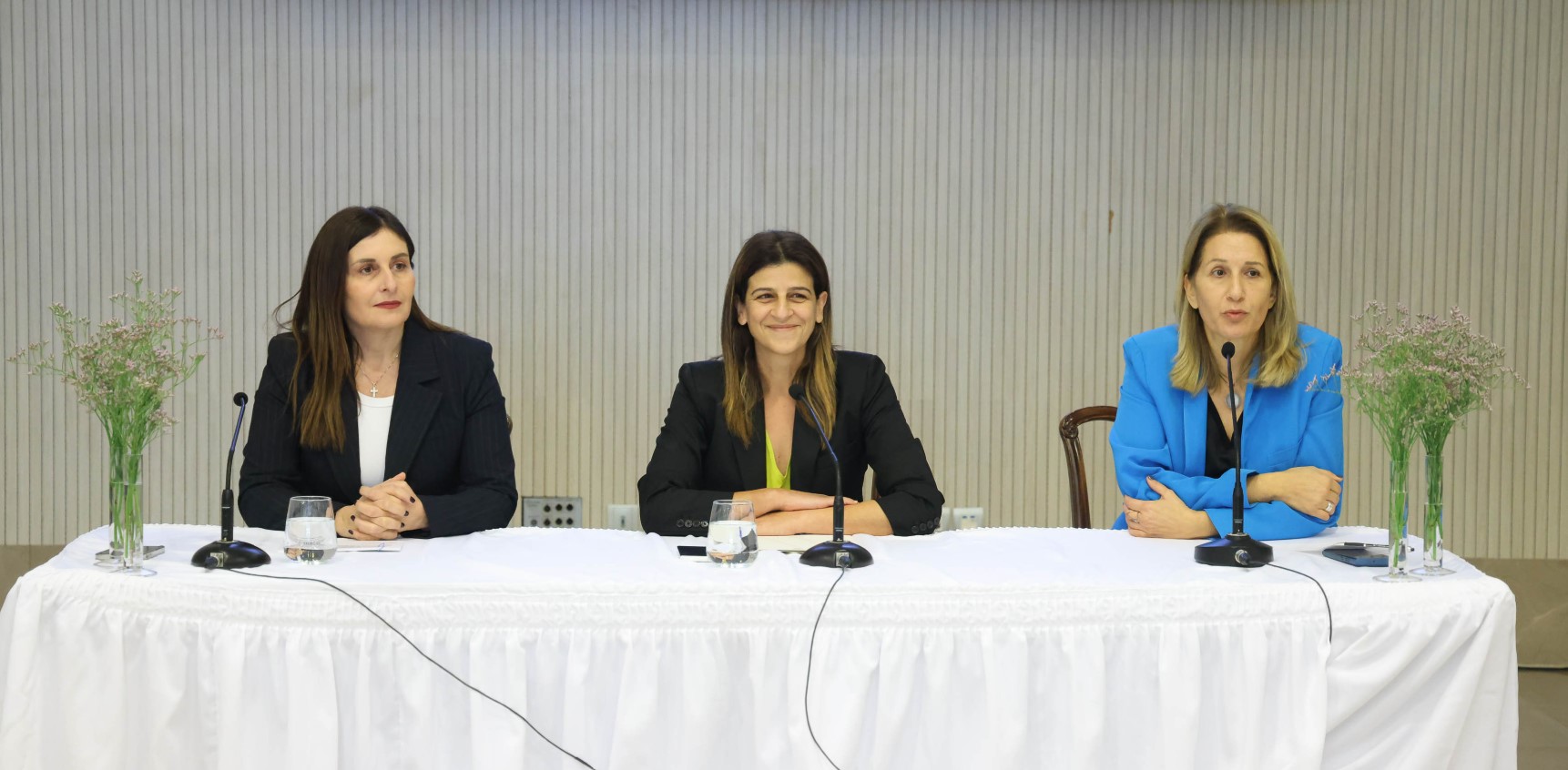
She stressed that the balanced participation of both women and men across all areas of economic activity could bring substantial benefits to society. According to the EU, improving gender equality by 2050 could increase the EU’s Gross National Product (GNP) by up to 9.6 per cent, equating to between €1.95 and €3.15 trillion.
The president’s administration has made gender equality a central priority, with Christodoulou’s office playing a pivotal role in coordinating policies aimed at dismantling traditional attitudes and promoting equal opportunities.
“Our aim is to allow men and women, girls and boys, to reach their full potential, far from stereotypical perceptions,” she explained.
To achieve this, she said, the National Strategy for Gender Equality has been devised, integrating gender considerations into public policy. She added, “The design of policies and actions should take into account the different needs of both genders.”
Turning her attention to the maritime sector, Christodoulou noted the significant underrepresentation of women.
Globally, women account for only 20 per cent of the maritime workforce, with a mere 2 per cent serving as seafarers.
“Shipping is an industry that is directly linked to our economy, to the global supply chain, and to our basic needs for goods and services. Yet women are under-represented,” she said.
In response, her office is conducting a survey to better understand gender disparities in maritime professions and is collaborating on initiatives to create a more gender-friendly environment within the sector.
One initiative, in partnership with the Ministry of Education, seeks to train career guidance counsellors to eliminate gender biases and encourage young people to pursue careers based on their abilities, not preconceived notions.
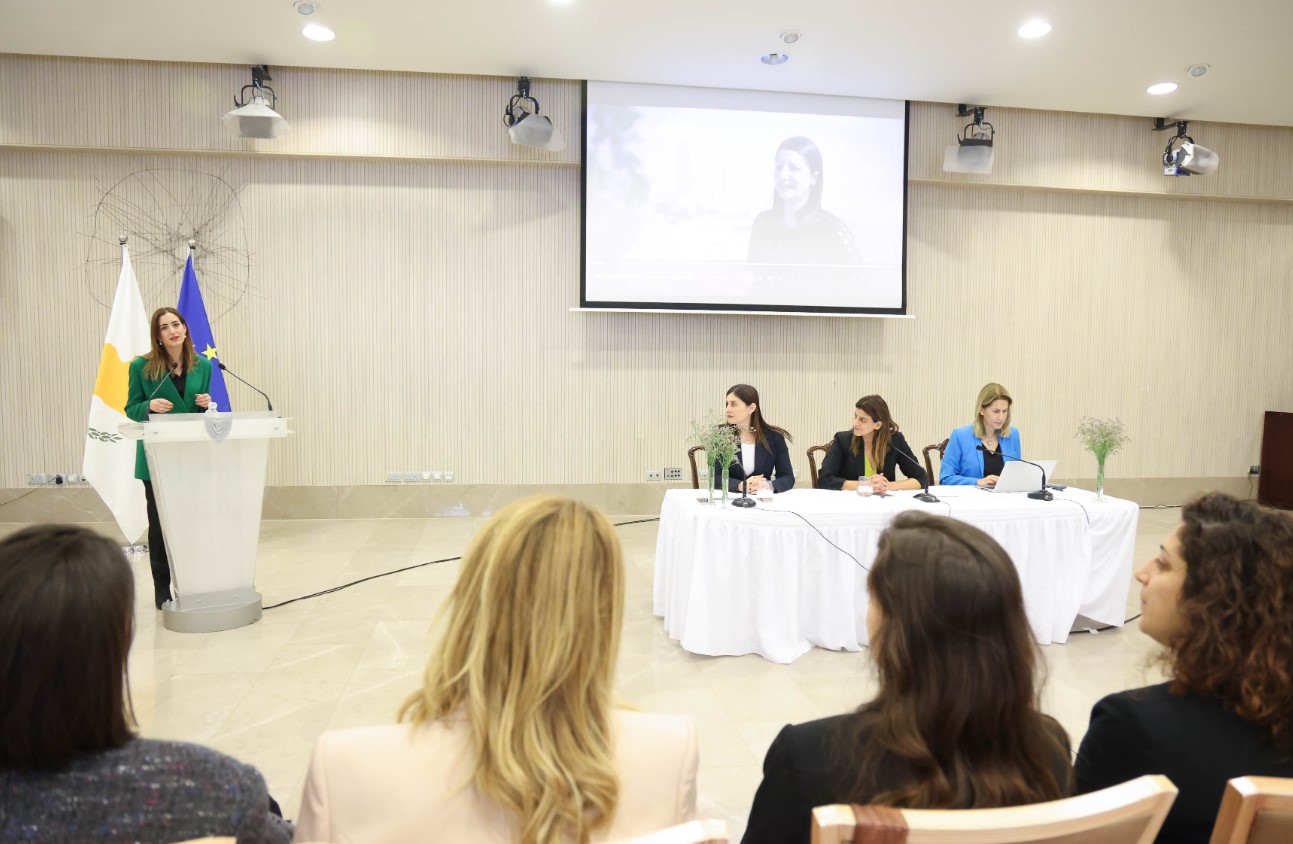
Christodoulou also highlighted the annual scholarships in memory of Christiana Kouta, aimed at women over 25 who wish to pursue careers in shipping and technology.
“Women take on multiple roles – as wives, workers, mothers, and daughters,” she remarked, referring to the government’s efforts to help reconcile personal and professional life. These efforts include extending parental leave, expanding access to childcare, and providing support for full-day schools.
Additionally, Cyprus has joined the US government’s ‘Women in Sustainable Economy’ programme, which aims to enhance women’s participation in both the green and blue sectors.
Christodoulou concluded by recognising the contributions of women like Hadjimanolis, who was recently named Maritime Person of the Year by the International Propeller Club.
She also commended the collaboration with various stakeholders, including businesses, academics, and civil society. “The aim of the ‘Women in Shipping’ campaign is precisely to raise awareness and encourage more active participation by women in the blue professions,” she said.
The campaign encourages young women to see shipping as an exciting and dynamic career, offering both personal and professional growth opportunities.
In her final remarks, Christodoulou expressed her sincere gratitude to the Deputy Shipping Ministry and the five campaign participants for their dedication and unwavering support in advancing gender equality within the maritime sector.


